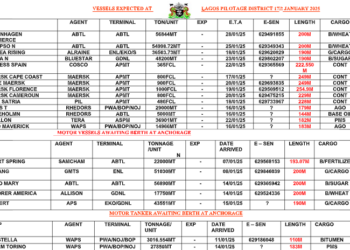Global shipping line; Maersk Line has altered its operations in Nigeria, Liberia, Sierra Leone and Guinea, citing the fast-spreading Ebola Virus.
Consequently, the shipping line which has frequent calls into Nigeria has suspended shore leave as well as crew change in these four nations, even though it said that normal calls would still continue.
Global shipping line; Maersk Line has altered its operations in Nigeria, Liberia, Sierra Leone and Guinea, citing the fast-spreading Ebola Virus.
Consequently, the shipping line which has frequent calls into Nigeria has suspended shore leave as well as crew change in these four nations, even though it said that normal calls would still continue.
Responding to questions, a spokesperson for Maersk said: “We have been following the situation for some time and sent out our first advisory to vessels calling at West African ports on 26 March. We have subsequently sent out several updates – to crews and land-based personnel – outlining additional health measures as per the WHO recommendations.
“We have also suspended shore leave as well as crew change in Liberia, Sierra Leone and Guinea as well as in Nigeria.”
Similarly, marine insurers have told their clients to ensure their crews take every precaution while calling at West African ports.
Protection & Indemnity (P&I) Clubs issued the warnings to shipowners last week over the risk of Ebola and told members crews need to be made fully aware of the risks they face.
Richard Stevens, claims executive at the Standard Club said that his organisation continues to monitor the outbreak of Ebola in West Africa and was aware that the World Health Organisation has reported a further increase of cases in the region
"The Club is guided by the views and recommendations issued by the World Health Organisation [WHO] and also our network of local correspondents.
We would advise all of our Members who trade in West Africa to be well aware of the current guidance issued by WHO," Stevens added. The Club noted that although WHO had not recommended any trade or travel restrictions to Guinea, Sierra Leone or Liberia (as of 27 July) it was "clearly of utmost importance for Members to monitor the health and wellbeing of their crews and take all necessary precautions to prevent infection".
With this in mind, Stevens said it was "prudent" to advise crews to remain aboard vessels whilst in ports in those countries in order to reduce the risk of coming into contact with individuals carrying the virus.
"Crews should be instructed to report any of the known initial symptoms of Ebola immediately and in the event of any member of crew falling unwell whilst in a high risk area immediate advice should be sought from medical services or a company doctor," he said.
The World Health Organization (WHO) has already declared the outbreak a ‘Public Health Emergency of International Concern’ (PHEIC), with implications for trade and travel, after the largest outbreak ever recorded of the disease caused the death of more than 900 people, infected hundreds of others and continues to spread. Under the conditions of the PHEIC, temporary recommendations to reduce the international spread of Ebola require that, with immediate effect, states affected should conduct exit screening of all persons at international airports, seaports and major land crossings, for unexplained febrile illness consistent with potential Ebola infection.
On the air transport front, earlier this week, British Airways announced the temporary suspension of its scheduled services to Liberia and Sierra Leone until 31 August, “due to the deteriorating public health situation in both countries”. It followed moves by other international airlines serving the two countries, as well as neighbouring Guinea.
















Discussion about this post